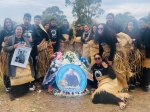
8.18.23
A couple of weeks ago, I traveled to Sydney, Australia, to attend the funeral of my brother, Sam Taufa (referred to as a first cousin in Western terms). Sam’s mother, Ma’ata Ngalo’afe, and my father, Tevita Vaiola Finau, are siblings. It is important to note that the word “cousin” does not exist in the Tongan language and culture. Our “cousins” are considered our brothers and sisters. The entire round-trip, spanning from Dallas-Fort Worth to Los Angeles and finally to Sydney, consumed two days in transit, accompanied by two days on location, and two weeks for recovery. I am still in recovery mode. (LOL) The airborne segment alone lasted over eighteen hours, while the rest comprised a 6-hour airport layover, complete with check-in, TSA, Customs, and baggage claim. While some may view the trip as unnecessary, in my family and culture, it is a part of our identity.
I typically take numerous photos and short videos for a couple of reasons. Firstly, I love capturing moments, enabling me to reflect upon them in the future. Secondly, when I participate in significant events like funerals, I recognize the value of allowing distant family members who couldn’t be present to witness the presence of other family members. Additionally, given the uncertainty of our next gathering, we seize the chance to capture photographs with our family. Despite being thousands of miles away, technology facilitates our connection and collective grieving. Furthermore, no matter the distance, the moana (ocean) connects life, for it is life.
Moreover, a funeral, particularly within the Tongan or Pasifika context, also serves as a family reunion. Despite the somber circumstances, it offers an opportunity for family members to reconnect. Sometimes, years or even decades may have passed since our last encounter, but we effortlessly pick up from where we left off when we gather. Occasionally, we may not have met, but our family connections through our parents and grandparents are significant enough that we pick up the bonding easily through talanoa or by telling stories. This atmosphere is lightened by humor being a substantial part of our family and culture. Consequently, even during this event, marked by sadness, the occasion retains a lighthearted quality. This perspective on life acknowledges the inevitability of both beginnings and endings, life and death.
Moreover, as a pastor, I’ve observed a distinct contrast in the nature of funerals. In the context of Tongan/Polynesian/Pasifika funerals, our family, friends, along with various churches, irrespective of their denominations and the broader community, come together to honor the departed and be present for the family. This collective presence is why our funerals often draw large attendances. This pattern sharply contrasts with the majority of funerals I have officiated or attended within American churches where I have served.
Several individuals unfamiliar with our culture have inquired about the wrap worn around our waist. Alongside wearing modest black attire, these wraps are known as ta’ovala and constitute the traditional dress code for Tongan funerals. The labor-intensive mat-woven ta’ovala worn to a funeral signifies one’s relationship to the deceased.
Tongan society and families adhere to a hierarchical structure. While Tonga might be perceived by some as upholding matriarchal traditions due to the higher rank of sisters over brothers, the distribution of roles and responsibilities actually maintains a harmonious balance between genders. A prime illustration of this is the ‘ulumotu’a role, entrusted to the eldest brother or son. This role entails overseeing significant family occasions, including funerals.
Within Tongan funerals, the ta’ovala you don reflects your place within the hierarchical structure in relation to the deceased. The father holds the position of the family head. This designation extends to the father’s brothers (referred to as uncles in Western terms), who are regarded as additional fathers. The highest rank on the hierarchy chart is held by the father’s sisters and their children, with the eldest sister occupying the top position, known as a “fahu.” This individual receives special recognition during funerals, weddings, and other family ceremonies.
When attending a funeral for a father’s sister or her children, demonstrating humility and rank involves donning the largest ta’ovala, which covers the body from head to toe. Those who of this rank are known as liongi. They are typically responsible for food preparation and serving. At a father’s funeral, his children also wear significant ta’ovala displaying great loss.
Tongan funerals are often financially demanding for families due to the comprehensive services (typically food) provided to visitors, primarily from churches, who visit the family in the days leading up to the wake and on the day and night of the funeral. Thankfully, family members, churches, and the community help. Traditionally, Tongan funerals span an entire night, culminating in a final worship service in the morning, followed by the burial ceremony.
It’s worth highlighting that the collaborative spirit of Tongans underscores our emphasis on communal living as opposed to individualism. This principle is integral to our identity and cultural fabric, which is why Pasifika families might not always prioritize accumulating wealth. It’s a rarity to encounter a Tongan family stockpiling possessions, for these belongings are typically shared with those within the community who require assistance.
Regarding Sam’s funeral, since his mother is my father’s younger sister, my designated role is a “liongi.” However, my sister Evaline, who would typically be considered a first cousin in Western terms but holds a higher rank due to being the daughter of my father’s sister Etina, gave me a pass because of my pastoral role. Such are the few benefits of being a Reverend! Haha. Representing our family as “liongi” were my two nieces, Mele and Mata (who traveled with me), and my nephew, Lieni (who lives in Sydney), in honor of their fathers, my brothers.
Additional customs are observed within the context of a funeral procession, encompassing practices such as the duration of wearing black attire to symbolize mourning and participating in rituals like hair-cutting ceremonies.
Fundamentally, the social hierarchy within Tongan society takes the form of a familial structure. Each individual is assigned a distinct role and position, analogous to finding a seat at a communal table. One might serve as a server at one table, only to be seated as the esteemed guest of honor at another.
Please inform me if you possess knowledge that contradicts my explanation of Tongan traditions and customs. My explanation is not definitive, and I am sure there are other significances I am unaware of. However, this is my understanding of Tongan funerals and the existing hierarchical system within our culture.
Malō ‘aupito.
Sela Finau
#SamTaufa #TonganFunerals #PasifikaCulture #Polynesian #Oceania #MoanaCulture



